What is happening in Afghanistan? Women’s rights explained as top UN figure in Kabul for talks on Taliban
and live on Freeview channel 276
The highest-ranking woman in the United Nations has arrived in Afghanistan for talks promoting the rights of women and girls in response to recent crackdowns by the Taliban.
Deputy Secretary-General Amina Mohammed, a former Nigerian Cabinet minister and a Muslim, was joined by Sima Bahous, executive director of UN Women, as part of a delegation meeting in Kabul. It comes after UN Secretary-General Antonio Guterres denounced the “unprecedented, systemic attacks on women’s and girls’ rights” in the country, which he said “are creating gender-based apartheid.”
Advertisement
Hide AdAdvertisement
Hide AdUN deputy spokesperson Farhan Haq confirmed that Khaled Khiari, Assistant Secretary General for political affairs, was also attending. But Mr Haq said he could not disclose any information about schedules of specific meetings for security reasons.
Since regaining power in August 2021, the Taliban has been severely restricting women’s rights - banning them from universities, parks and gyms, and making it mandatory to wear the burqa when outside the home. Women in Kabul have staged protests, and various countries, including the UK and the US, have condemned the crackdown on freedom.
The UN is now holding a series of high-level consultations across the Gulf, Asia, and Europe “to discuss the situation in Afghanistan” as they try to promote and protect “women’s and girls’ rights, peaceful coexistence, and sustainable development.” But what exactly is happening in Afghanistan, how are women being treated, are there famine concerns, and what is being done to help?
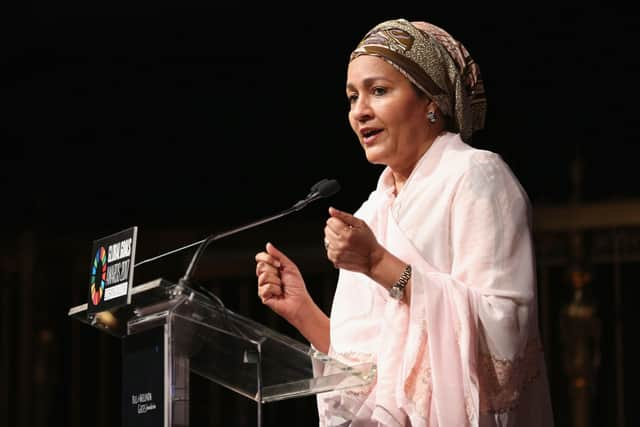

What has happened in Afghanistan?
The Taliban regained control of Afghanistan in August 2021. Officials initially promised a more moderate rule than the draconian one between 1996 and 2001, but instead there has widely been harsher interpretation of Islamic Law, or Sharia, with harsh restrictions imposed on women.
Advertisement
Hide AdAdvertisement
Hide AdOne of the first crackdowns the hardline clerical regime enacted was mandating a head-to-toe burqa for women whilst out in public. Otherwise, their “male guardian” could face three days in prison.
Shir Mohammad, an official from the vice and virtue ministry, said: “For all dignified Afghan women, wearing Hajib is necessary and the best Hajib is chadori (the head-to-toe burka) which is part of our tradition and is respectful. Those women who are not too old or young must cover their face, except the eyes.”
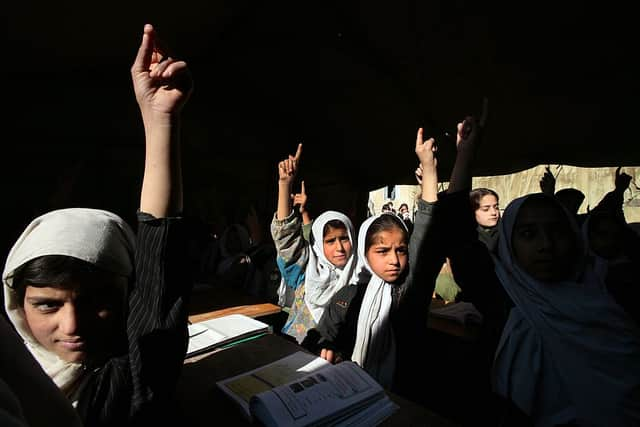

The decree added that if women have no important work to be done outside, it is better for them to stay at home, with Mr Hanafi declaring: “Islamic principles and Islamic ideology are more important to us than anything else.”
In March 2022, the Taliban drew further criticism from various foreign governments for making a U-turn on a previous commitment to open educational institutions to girls beyond grade six. Despite promising the opposite, on the first day of the new school year, government officials announced that high schools would remain closed for girls.
Advertisement
Hide AdAdvertisement
Hide AdThe Taliban said access to education would only be reopened once a plan was established which ensured girls’ attendance complied with its strict interpretation of Islamic Sharia law.
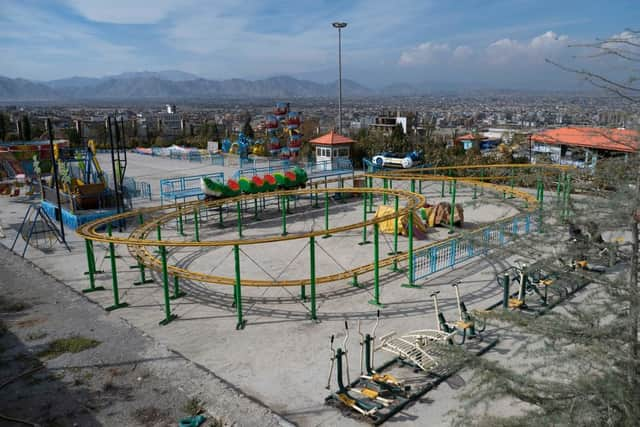

Things only escalated from there. Women became banned from entering most fields of employment, and prohibited from travelling without a male escort. They then became excluded from public spaces, with the Taliban listing gyms, parks and funfairs as places women were forbidden from.
Raihana, 21, was met with the rule change after arriving at a park to spend the day with her sisters. She told AFP at the time: “Obviously, in Islam, it is allowed to go out and visit parks. When you have no freedom in your own country, then what does it mean to live here?”
Meanwhile, a female personal trainer, who did not wish to be named out of fear of reprisals, told The Times that women and men were not exercising together - despite the Taliban saying this was the reason the ban had been implemented. She said: “The Taliban are lying. We were training separately.” She also described how women at the gym had been arrested on the day of the closure. “Now, I don’t know if they’re alive or dead.”
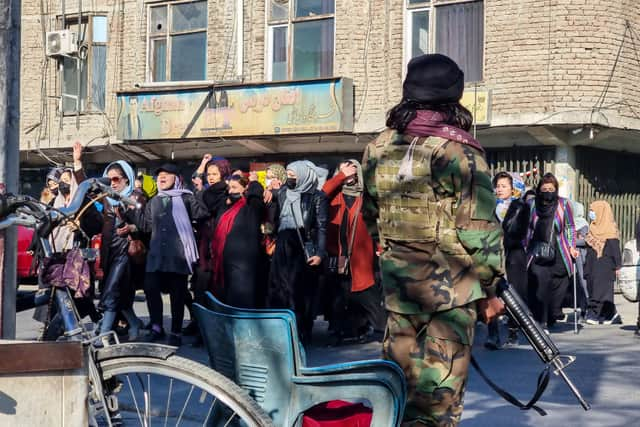

Advertisement
Hide AdAdvertisement
Hide AdThe most recent crackdown came in December, when the Taliban banned all women from both private and public universities. It sparked widespread despair among young people in the country, particularly as it came just weeks after Afghan girls took their graduation exams.
A third-year journalism and communication student at Nangarhar University said: “I can’t fulfil my dreams, my hopes. Everything is disappearing before my eyes and I can’t do anything about it.” She wished to remain anonymous out of fear for her safety.
Women staged protests in Kabul following the news, although officials from the Taliban quickly shut down the demonstrations. “Today we come out on the streets of Kabul to raise our voices against the closure of the girls’ universities,” protesters from the Afghanistan Women’s Unity and Solidarity group said.


Are there fears of famine in Afghanistan?
On 24 December, the Taliban banned women from working for non governmental organisations - many of which help provide vital aid to Afghans across the country and keep millions alive. Norwegian Refugee Council, a major humanitarian group, has since warned that this restriction could push six million people into famine - and potentially leave 13.5 million people without a safe water supply as well as 14.1 million people without protection services.
Advertisement
Hide AdAdvertisement
Hide AdIn a video posted to Twitter, he said: “We are not giving aid to the hundreds of thousands of people we serve here in Afghanistan. And it’s raining, it’s snowing, it’s miserable. And not to give them aid is so painful for us. But only if we are able to resume work with females according to all of the Afghan traditional values will we start work again, and I hope we will find a solution very soon.”
UN officials added that the move effectively suspended scores of humanitarian programmes in a country where millions of people need urgent aid.
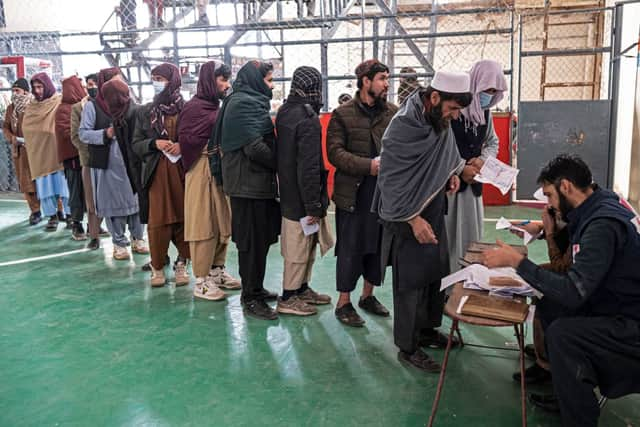

What has the international response been?
The Taliban’s rule has been condemned by countries and human rights organisations around the world. When the burqa was enforced, Heather Barr, Afghanistan researcher at Human Rights Watch, urged the international community to put co-ordinated pressure on the Taliban. She said: “(It is) far past time for a serious and strategic response to the Taliban’s escalating assault on women’s rights.”
When women were excluded from parks, gyms and funfairs, Alison Davidian, the United Nations special representative in Afghanistan for women, said: “This is yet another example of the Taliban’s continued and systematic erasure of women from public life. We call on the Taliban to reinstate all rights and freedoms for women and girls.”
Advertisement
Hide AdAdvertisement
Hide AdSpeaking out against women’s exclusion from universities, Barbara Woodward, the UK’s ambassador for the UN, said it was “another egregious curtailment of women’s rights”, “a deep and profound disappointment for every single female student”, and “another step by the Taliban away from a self-reliant and prosperous Afghanistan.”
Meanwhile, Antony Blinken, US Secretary of State, added: “The Taliban cannot expect to be a legitimate member of the international community until they respect the rights of all in Afghanistan. No country can thrive when half of its population is held back.”
As a result of the Taliban’s harsh rule, Afghanistan’s seat at the UN is still held by the previous government, led by former President Ashraf Ghani - in spite of requests from the Taliban to represent the country.
What is the UN doing now?
UN officials have been meeting to discuss the situation in Afghanistan and create a plan for how to protect women’s and girls’ rights. Members of the delegation recently met with leaders of the 57-nation Organisation of the Islamic Conference, the Islamic Development Bank, various groups of Afghan women in Ankara, Turkey, and Islamabad, and a group of ambassadors and special envoys to Afghanistan based in Doha, the capital of Qatar.
Advertisement
Hide AdAdvertisement
Hide AdSpokesperson Mr Haq said that throughout the meetings, the “need for a revitalised and realistic political pathway was consistently highlighted and all [nations] remained firm on the fundamental principles, including women’s and girls’ rights to education, work and public life in Afghanistan.”
He added that nations had agreed on “the need to continue to deliver lifesaving support” following the devastating earthquake in June, and that looking ahead to the possibility of famine, there was recognition that efforts should be intensified to “reflect the urgency of the situation.”
Groups also agreed in principle to hold an international conference on women and girls in the Muslim world in March, he added.
Comment Guidelines
National World encourages reader discussion on our stories. User feedback, insights and back-and-forth exchanges add a rich layer of context to reporting. Please review our Community Guidelines before commenting.
